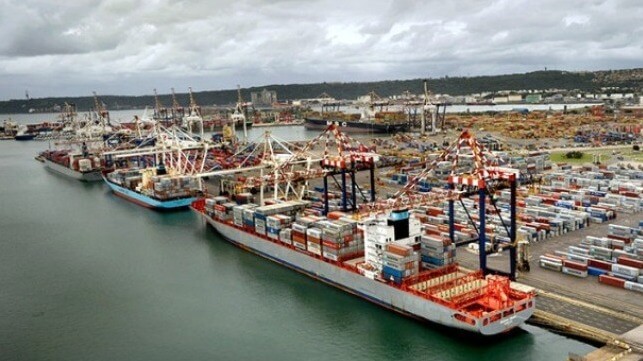South Africa’s Largest Union Accepts Deal to End Crippling Port Strike

A wage agreement was reached with the majority union in the bitter and sometimes violent two-week strike that has crippled South Africa’s ports. The agreement was negotiated by the Commission for Conciliation, Mediation and Arbitration, and Transnet, the state-owned operator of the ports and rail network, said work would resume while the minority unions say they are not mandated to accept the agreement. It is unclear if work can resume without an agreement with the minority union.
Similar to the disputes at the UK and German ports this year, South African workers went on strike demanding higher wages in line with the current rate of inflation. The United Transport and Allied Trade Union (UNTU), which represents approximately 54 percent of Transnet’s unionized employees, along with the smaller South African Transport and Allied Workers Union (SATAWU) began the strike on October 6. They cited the recent reports of retail inflation at nearly eight percent in South Africa.
Transnet Port Terminals operates container terminals at Durban, Ngqura, Port Elizabeth, and Cape Town, which in total have the capacity to handle about five million TEU annually. They also handle the minerals exports at Richard Bay, Port Elizabeth, and Saldanha, and the Ro-Ro, bulk, and break-bulk cargoes including large quantities of agricultural exports.
The company called it an illegal strike and threatened legal action against the strikers and especially anyone caught causing damage to the facilities. At the end of last week, they reported that an employee had been shot traveling to work and she was taken to a hospital. The company issued a statement saying the police were investigating the case as attempted murder and also looking into malicious damage to property. “Transnet discourages the acts of intimidation and violence towards employees who are not participating in the strike,” the company wrote on its social media.
Exporters said the strike however had impacted their ability to ship cargo including large amounts of perishables. The Minerals Council of South Africa reported that the ports for mineral exports were operating at under 30 percent of their daily averages and in some cases as low as one-eight of their normal volumes. They estimated the strike was costing South African miners as much as $44 million a day.
Saying that wages make up as much as two-thirds of Transnet’s operating expenses the company said the unions’ demands were not sustainable. They initially offered between three and four percent raises before increasing the offer to over five percent. Today’s announcement said there would be a six percent increase retroactive to April 1, followed by a five-and-a-half percent raise next year, and a six percent raise in year three. They are also increasing the medical aid subsidy and housing allowance starting in 2023.

that matters most
Get the latest maritime news delivered to your inbox daily.
The agreement ends the strike by UNTU members effective immediately. Transnet said its priority would be the immediate clearing of any backlogs across the ports and rail system. They said they would be prioritizing urgent and time-sensitive cargoes while also implementing recovery plans working with industry and customers.
Late today, however, the SATAWU said it had received and rejected a similar six percent offer from the arbitration body. South African media is reporting that the minority union is holding out for a 13 percent increase. Union officials are being quoted that the strike will continue until the members instruct the union to end the action.
